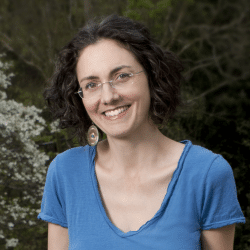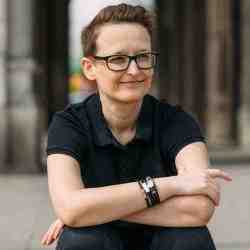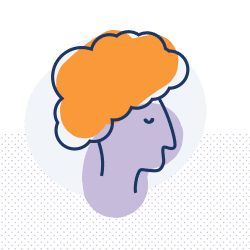Introduction
Mariana breaks with the poverty cycle and develops a Social Reintegration and Gender Equality Model of young woman. Through her organization Laboratoria, prepares them to technical and socio emotional level to give their first step in a career. At the same the time Mariana is able to find quality employments to hundreds of women in Latin America.
The New Idea
By creating a pathway for young women from vulnerable communities into the digital economy workforce, Mariana is changing the way young people from low income backgrounds are prepared for the jobs of the future.
As in many parts of the world, young people from vulnerable communities in Peru, especially young women, lack quality educational and job opportunities. Meanwhile, a rapidly growing global digital economy means the technology sector job market is growing faster than the supply of skilled programmers. Seeing this as an opportunity, Mariana is achieving what the formal education and vocational training system has failed to do: supporting disadvantaged young people to access good-paying professional jobs in the fastest growing global industry. And she does it in six months.
Most vocational training programs for low-income people, and particularly women, focus on low-skilled jobs that do not offer a promising career or profession. Yet, in her own business experience, Mariana saw many successful software developers who were entirely self-taught or internet-trained. She created her company Laboratoria to give young women from vulnerable communities new opportunities for a professional career, and to do so in a more effective and economical way than universities and vocational programs.
Mariana efficiently identifies young talent in vulnerable communities, equips them with skills for digital jobs, and connects them to the job market. Her innovative model, which helps young people develop not only the technical skills of programming jobs but also the social and emotional skills they need to thrive, has an 80-85% job placement rate. The graduates not only get a job, they begin a career in a sector with significant opportunities for growth, setting themselves on a path out of poverty and into the middle class.
By focusing specifically on young women, Mariana is also changing the face of the tech industry in Peru, where women are currently a small minority. She is closing the gender gap and diversifying the industry, bringing talent to the sector that it needs to grow while empowering women to be part of an industry that is defining the future.
The Problem
The talent and potential of millions of young people in Peru and elsewhere is being lost to society. Twenty percent of young Peruvians between 15 and 24 years old neither study nor work, and almost 70% of this group are women. Young women who do manage to find work generally do so in housework or other low-skilled jobs and thus have little social mobility. One in three women in Latin America does not have her own income. In addition to the losses in terms of development for the country, the reality of young people without opportunities leads to higher rates of violence and, in the case of women, higher risk of unwanted pregnancies. In Peru, 14.6% of teenage girls are mothers, making it even harder to break the vicious circle of poverty.
Part of the problem is access to higher education, which is a privilege of the few in Peru. According to the research of Analysis Group for Development (GRADE), only 1 in 5 young Peruvians continue with their studies after finishing high school (Leon y Sugimaru, 2013). Where most higher education is private and expensive, many talented young people cannot access it because of the cost. As such, young people, and women especially, do not have the possibility to build a better future for themselves and their families.
Vocational and technical training programs are low quality and do not keep up with the needs of the market, especially in the rapidly changing field of technology. Most vocational programs in Peru are focused on jobs such as cooking, administration, machinery maintenance, tourism, graphic arts, textiles. The quality of these programs is low and they do not meet the existing demand. Programs in computer science, even at the university level, struggle to keep updated to the latest technologies and are available to only a few. For instance, the University of San Pablo de Arequipa, one of the best places to study computer science in Peru, graduates only 30 students per year, and 60% of them go to work outside Peru.
The problem of unemployment continues to grow despite the fact that there is a growing global industry in need of talent. According to the IDB, software developer is one of the ten jobs that will grow in demand in the next decade. Because of the now pervasive role of digital technology, the demand for software development is growing not just in an isolated tech sector but across industries. The Inter-American Development Bank predicts that by 2025, Latin America will need over 1.2 million software developers. A Cisco study said that for 2019, the gap in the industry will be over 440,000 jobs. In addition to the general market gap, there is an enormous gender gap in this field. In Peru, only 7% of the current developers are women (Mozzilla 2014), a level of participation in the industry that is similar across Latin America.
The tech industry also offers a unique opportunity. In 2014, Mariana carried out a survey of more than 20 web development companies, and 70% of them said they have no prejudice against self-taught developers. It is a field that does not demand traditional higher education and thus provides an opportunity to develop alternatives to an education system that is not working for the majority of young people.
The Strategy
Mariana is creating new possibilities for young disadvantaged women by identifying talent from vulnerable communities, equipping them with skills for the digital economy workforce, and connecting them to the rapidly growing tech sector job market. Through her model, she is not only increasing the incomes of participants by a factor of five, she is also demonstrating an alternative approach to educating and training vulnerable young people for professional job opportunities.
Mariana’s company Laboratoria searches for talent where no one else is looking. They use a rigorous methodology that focuses on finding young women in vulnerable areas who have potential for success, not only in the program but also in professional life. Unlike with other educational opportunities that often require payment to access, participants pay for Laboratoria’s program only if and when they get a job. Therefore, there is no cost barrier to entry.
To market the program, Mariana works with different allies, including social organizations with presence in vulnerable areas, as well as NGOs and local leaders networks that support Laboratoria to spread the call for applications in their communities. Given that the majority of their young target group uses Facebook, they use social media as their principal marketing strategy. The use of paid ad campaigns allows them to test different messages at scale and compare the success of each in bringing in the best applicants. They also use Facebook Live to interview graduates and have them share their experiences. But to ensure they reach those who may not be on social media, each time Laboratoria has a call for applications, they also use traditional mass media—television and newspapers—to spread the information. Additionally, Laboratoria incentivizes its alumni network to provide references.
The selection process seeks to identify young women aged 18-30 who come from vulnerable communities and who have the potential to succeed in the tech industry. The process assesses cognitive abilities and soft skills as well as interest in or openness to the tech field. It starts with an online survey to determine family, work, and education background as indicators of socio-economic status. Any applicants with educational attainment or family income above a certain level are rejected at this stage to ensure the benefit to the target population. Those who meet the economic profile go on to a series of tests to assess for the basic cognitive abilities that will be required, and those who score above a certain level continue on to a “pre-work” stage that consists of an online coding course to give applicants a sense of what they will be learning. Anyone who wants to continue on at this point then joins an in-person weeklong immersion learning experience that gives the Laboratoria team the chance to assess the applicants’ communication and teamwork skills and to observe how they embrace the learning process and how they tolerate frustration. Everyone who participates in the weeklong immersion is then interviewed by the Laboratoria team as the final stage, providing the chance for both applicant and Laboratoria to review how the week went and whether the applicant really wants to pursue this path.
Those that make it through the selection process then enter a two year program that includes an intensive six-month bootcamp, followed by a year and a half of part-time continuing education opportunities. The program equips young women with all the skills they need to find a job and succeed as software developers. The bootcamp forms the participants in the technical skills and concepts, tools and computer programming languages that enable them to become junior developers at any company that develops websites or software. Currently, Laboratoria only prepares the women for front-end developer jobs, but will soon add additional tracks for user experience designers and mobile designers. Beyond the technical skills, unlike other education and training approaches, Laboratoria also prioritizes personal growth and the development of social-emotional skills such as perseverance, self-confidence, and teamwork. Guided by psychologists, 25% of the training time is devoted to developing such skills. Laboratoria uses the Agile Classroom approach, in which students self-organize and self-assess, working always in teams and going through rapid cycles of iteration and feedback. This collaborative, self-learning approach not only helps the young people develop the skills they need as programmers but also equips them for professional and life success. As participants regularly reflect about what they are doing and what they have to improve, they also strengthen their self-awareness and critical thinking, essential skills in a fast-changing industry. As part of the curriculum, Mariana also brings in guest speakers each week to guide and inspire participants in their learning and show them what is possible. After the six-month bootcamp, participants go on to find jobs but participate for another eighteen months in continuing education courses in both technical skills as well as an English language course to expand their opportunities. Once participants have a job, they then pay Laboratoria either a set monthly rate for the continuing education or a percentage of their salary on a sliding scale.
In addition to identifying talent and equipping young people for success, Mariana also bridges the divide between these young people from disadvantaged backgrounds and companies in need of talent. In doing so, she achieves what universities and other job training programs do not – an 80-85% job placement rate for graduates. Mariana has formed a network of 500 partner companies—tech companies and, increasingly, non-tech companies building in-house tech teams as the market evolves—that employ developers. This network validates Laboratoria’s curriculum to ensure graduates emerge with the skills companies need, and many of the companies hire Laboratoria graduates. For all graduates of the bootcamp who meet the expected levels of technical skill and personal development, Laboratoria provides them with an employment recommendation. In general, 85-90% of the graduates receive this recommendation. Laboratoria also supports the job placement process by engaging its network of partner companies in events such as talent fests, hackathons, and demo days at the end of each bootcamp. These events, some of which the companies pay to participate in, enable the companies to see the graduates in action and make hires. The program is helping companies find female tech talent and experience the value of building diverse teams, and contributing to changing the culture in the tech sector to be more inclusive. In the markets where Laboratoria works, most of the first female developers hired by companies came through the program. Already after only a few years of operation, the vast majority of women appearing at tech events in Peru also came through Laboratoria.
Laboratoria, which started in 2014, now has two centers in Peru—in Lima and Arequipa—and two others in Mexico and Chile. They graduate approximately 500 young women each year, with a job placement rate of 80-85%. With six months of training, most of their graduates go from never having worked in a formal sector job, earning around $150/month in low-skill work, to employment in the financial center of the city as programmers, earning $700/month. In many cases, this represents double the prior income of their entire families. Joining the tech teams of world-class companies, they improve their social mobility and their view of their future. They also serve as role models for their families and many more women in their communities.
As an example, Cecilia is 19 years old and living in San Juan de Lurigancho (Lima). Originally from Tarma, in her teens she moved to the capital to finish school. She graduated with good grades from a public school and spent time at the academy to enter the Public National University of San Marcos, but due to economic problems she had to leave. She spent a year without doing much other than helping her mother at home. Her brother heard about Laboratoria and suggested that she apply. Before even graduating from Laboratoria, Cecilia got a job at Total Courses, a start-up launched by Wayra. Today she is the only woman on the development team of the company. She has doubled her family income and is helping to improve the services they have in their home.
Mariana wants to have ten training centers across Latin America by 2020, positioning Laboratoria as the leading source of female tech talent on the continent. She is developing a social franchise model to achieve this. But she is also increasingly connecting with governmental, non-governmental, and private sector organizations to spread the insights of her model and to influence education and youth development policies. The Peruvian government provided a grant that enabled the opening of Laboratoria’s Arequipa center. INSEAD is developing an impact evaluation methodology for the program. Google has provided a grant that will enable Laboratoria to open-source their curriculum so that many more will have access to it. The Chilean Ministry of Education has contracted Mariana to share Laboratoria’s best practices with other skills training organizations in Chile. Mariana also works with the Inter-American Development Bank to support the strengthening and scale of the project at a regional level. Additionally, she has an alliance with CONCYTEC, a public sector promoter of technological innovation, as part of her efforts to accelerate technological transfer and social inclusion. Ultimately, she wants to see governments bet on large-scale work formation programs that incorporate the dimension of personal growth, prepare youth for employment, and respond to sectors of high demand in the market.
The Person
In her childhood, Mariana’s mother, a lover of the arts and history, taught her what generosity was by example, and her father taught her to work hard and believe that with effort, commitment and dedication she could do something about all things she did not like in the world. Mariana was always inspired by the independence of her grandmother, who at 20 years of age moved alone to a distant country to work when women did not do such things. Mariana followed in her footsteps, going to London to study at the age of 18. She obtained her BSSc in International Relations at the London School of Economics, where she was president of the Peruvian Association of Students and Academic Secretary of the Latin American Student Association. After completing her studies in London, uninspired to follow most of her peers into investment banking, she moved to Washington D.C. to work with the Organization of American States (OAS), where she organized a project to increase access to civil registration in Guatemala, El Salvador and Haiti. On the side, she wrote a blog about Peruvian issues. In 2013, after obtaining a Master’s Degree in Public Administration in Development Practice at Columbia University, where she was also involved in the Latin American Students Society, she decided it was time to return to Peru.
Upon returning, with her husband, a software developer, and a friend, she co-founded Ayu, a digital agency that in its first year of operations obtained more than US$200,000 in sales. She led strategy development and administration for the company, managing website and software development projects with leading companies in Peru. As they built the company, she noticed three things: 1) how difficult it was to find developers, 2) how all the developers they did find were men, and 3) how the developers had very diverse backgrounds, with many having been self-taught. These observations ultimately led her to create Laboratoria, to focus on empowering young women from vulnerable sectors of Peru to develop careers in a growing global industry.
Mariana has been the recipient of major awards, including the recognition as Young Innovators under 35 granted by the MIT Technology Review. She is one of the leaders of Peru as Global Shaper of the World Economic Forum. In 2016, Mariana was 1 of the 9 Latin Americans to figure out in The BBC list “100 women of 2016”. In June of the same year, she also had the opportunity to participate in a panel with Mark Zuckerberg and Barack Obama at the Global Entrepreneurship Summit 2016 at Stanford University.




